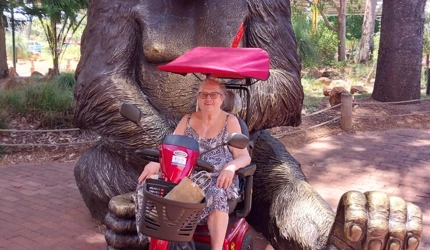Caring for someone with dementia at home can be both challenging and deeply rewarding. Some days flow smoothly, while others can bring some challenges. If you're navigating this journey, you don't have to do it alone.
Help is available in many forms — from professional in-home care and practical assistive tools to respite programs that give you both a break. You can access these services through government-funded support, including the new Support at Home program (launching November 2025).
At Brightwater, we understand what it takes to support someone with dementia at home. With expertise in dementia care and brain health through our Brightwater Centre for Research & Innovation, we're here to help your loved one stay at home longer, living as independently and comfortably as possible.
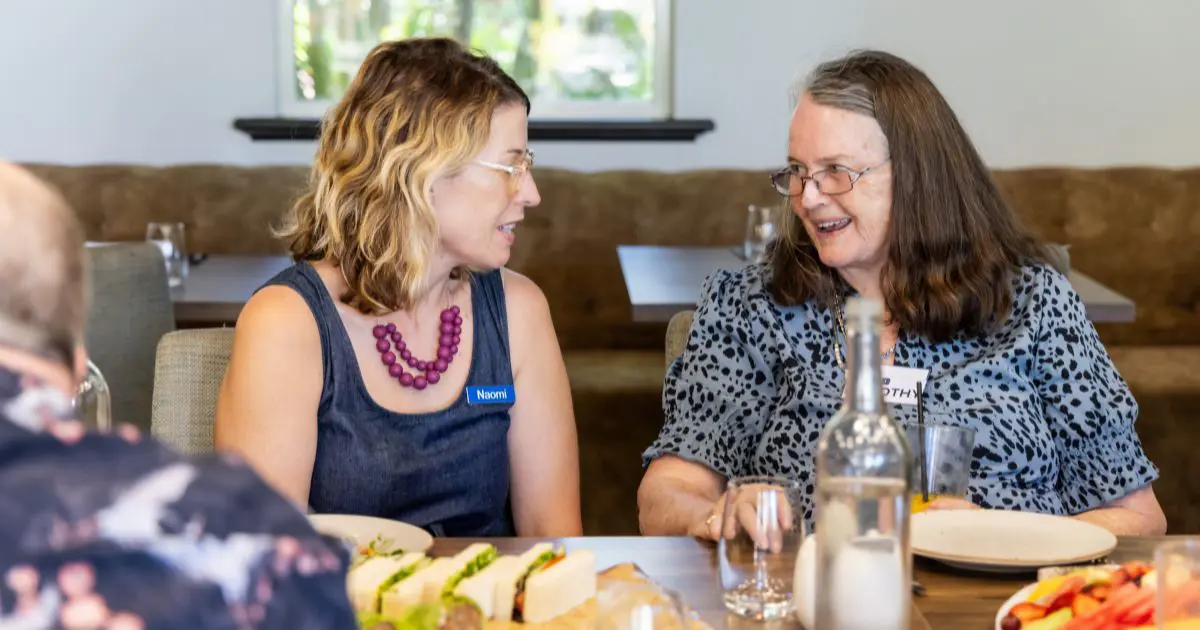
What dementia support at home can include
Supporting someone with dementia at home is about more than personal care, it's about creating a complete network of support that evolves with changing needs.
Depending on your eligibility and preferences, dementia support at home with Brightwater can be provided through the new Support at Home program, the Commonwealth Home Support Programme (CHSP), or as privately funded services.
Brightwater can tailor a mix of services to your situation, which may include:
- Personal care: assistance with showering, dressing, grooming and continence support - helping maintain dignity and routine.
- Clinical care: covering medication management, nursing services, physiotherapy and other allied health support to manage health conditions alongside dementia.
- Transport and mobility support: helping your loved one get to appointments, social activities or simply out in the community.
- In-home respite: allowing you to take a break while your loved one receives quality care in the comfort of their home.
- Household help: taking care of cleaning, shopping, gardening and meal preparation, reducing stress for everyone.
- Assistive technology and safety tools: includes medication reminders, fall detectors, memory aids and smart home devices that support safety and independence.
Brightwater's team is experienced in both dementia care and brain health.
Our skilled staff provide consistent, personalised care built around what matters most to you and your loved one. Care plans are flexible and evolve over time, adapting as dementia progresses.
Learn more about Support at Home, CHSP and private services.
Tools and technology to make life easier
Having the right tools can make a real difference in daily life — helping your loved ones stay safer, more independent and confident at home. These tools can include:
- Medication reminders and dispensers: includes pill boxes with compartments labelled by day or time, automatic dispensers that alert when it's time for medication, mobile apps for tracking medications and Webster-paks from pharmacies that organise medications by dose and time.
- Date and time tools: like day-night-clocks, phone reminders, whiteboards for listing tasks, and clocks showing the time, day and date help maintain routine and reduce confusion.
- Item finders: such as signs and photos labelling rooms and cupboards, Bluetooth tags you can track with an app, and item finders with remotes that make a sound when activated help locate important belongings.
- Safety devices: including electrical safety switches, gas leak detectors, automatic stove shut-off devices, safety irons, flood detectors, door and window sensors, fall detector alarms, motion sensor lights and smart home automation systems.
- Communication tools: like communication cards and resource materials can help when expressing needs become more difficult.
- Sensory aids: from therapy dolls and robot pets to sensory cushions with different textures provide stimulation and comfort. Noise-cancelling headphones and weighted blankets can help when feeling overwhelmed.
The list above is not a full list of services or items funded by the Support at Home program. Some of the assistance technologies mentioned may be funded through the program’s Assistive Technology and Home Modifications (AT-HM) scheme, or included in your individual care plan, depending on your needs and eligibility. The National Equipment Database has more information about the broader range of technology and aids that can help you live at home safely whether you are enquiring to obtain the equipment through the CHSP or Support at Home programs, or paying privately.
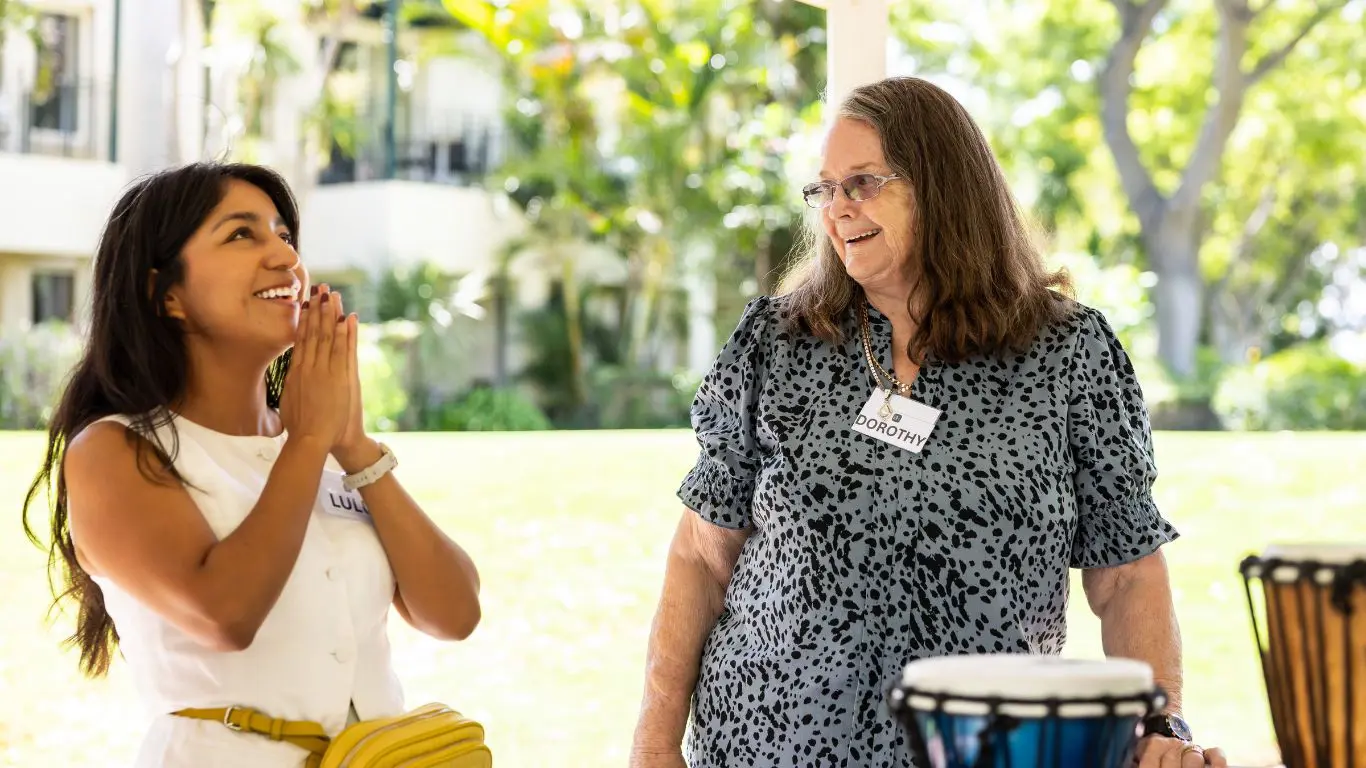
A different kind of dementia respite: retreat-style support
BrightRespite is Brightwater's specialist dementia respite program - but rather than feeling like traditional respite, it’s designed as a shared retreat for five carer–loved one pairs. Brightwater dementia expert, Michelle Harris explains BrightRespite is designed to refresh and empower carers while providing quality care and enriching activities for people living with mild to moderate dementia.
The program is more than just a break; it's an opportunity for participants to gain vital skills, connect with others who understand their experience, and rediscover balance in their caregiving journey.
"The focus is on wellness, educations and how to utilise their funding effectively and plan so they are in control." Michelle said.
She noted carers who attended the program had often remarked on how the program 'identified solutions to help me maximise my husband's quality of life' and 'reduced my guilt when asking for help, knowing how much I need it.'
Learn more about BrightRespite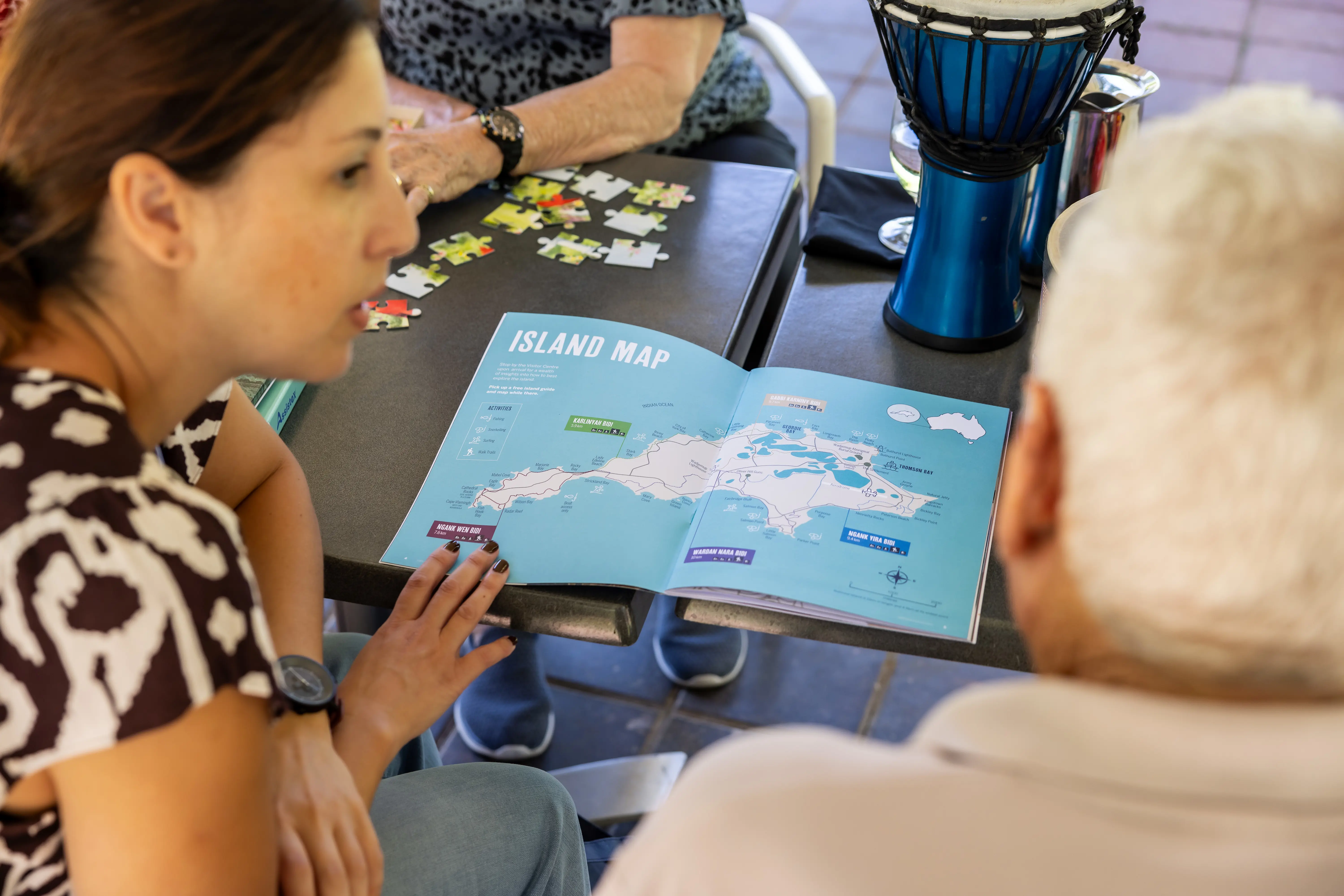
Quick tips for supporting a loved one with dementia
Michelle recommended having an occupational therapist audit your home to identify what can be done to maintain a person's independence.
"This may include artificial intelligence such as Siri to alarm for meals or medication prompts, a GPS watch to locate someone if they get lost, assistive technologies on fridges to identify if it has been opened (if it hasn't, it may be a sign the person is forgetting to eat), or it may even be a phone with pictures to ease connection," she said.
Small changes in how you approach daily life can make things easier for both of you:
- Keep up routines: Familiar patterns provide comfort and help your loved one know what to expect each day
- Speak calmly and simply: Use short sentences, give them time to respond, and maintain a gentle tone even when repeating yourself
- Let them do what they can: Encourage independence by allowing your loved one to complete tasks they're able to do, even if it takes longer
- Use reminders and visual cues: Labels, notes, photos and signs help prompt memory and reduce frustration
- Create calm mealtimes: Minimise distractions, use contrasting coloured plates against the table, and keep the environment relaxed
- Play music and do familiar activities: Songs from earlier years and enjoyable activities can spark connection and positive emotions
- Look after your own wellbeing: You can't pour from an empty cup. Taking breaks and accepting help isn't selfish, it's necessary.
For more detailed guidance on adapting your home environment, read our article on making your home more dementia-friendly.

Considering home care vs aged care
For someone in the early to mid-stages of dementia, staying at home often provides the best quality of life. Home care allows your loved one to maintain independence, stay in familiar surroundings, remain connected to their community, and keep the companionship of pets.
Home care also means your loved one can keep their routines, see familiar faces, and feel more in control of their daily life. These factors can slow cognitive decline and improve overall wellbeing.
That said, dementia is progressive. As care needs increase, you may eventually consider residential aged care. Brightwater offers both in-home support and aged care facilities, so when needs evolve, we can continue supporting your family through that transition.
You don't have to decide everything now. Focus on what works today and know that support is available for whatever comes next.
How to get started with dementia support
Getting support in place is simpler than you might think.
- Get assessed via My Aged Care: Call 1800 200 422 or visit myagedcare.gov.au to register and arrange an assessment. The assessor will discuss your loved one's needs and determine eligibility for government-funded services.
- Get in touch with Brightwater about your situation: Contact us to discuss what support would be most helpful. We'll listen to your concerns and explain how we can help
- Together, we co-design a personalised support plan: Your input shapes the care your loved one receives. We work with you to create a plan that reflects their preferences, routines and goals
- Brightwater adapts as your loved one's needs change: Dementia care isn't static. We regularly review and adjust support to ensure it continues meeting evolving needs.
The Support at Home program launches in November 2025, bringing more flexible funding levels and tailored support options. If you're already receiving care under the current Home Care Package system, your services will transition automatically.
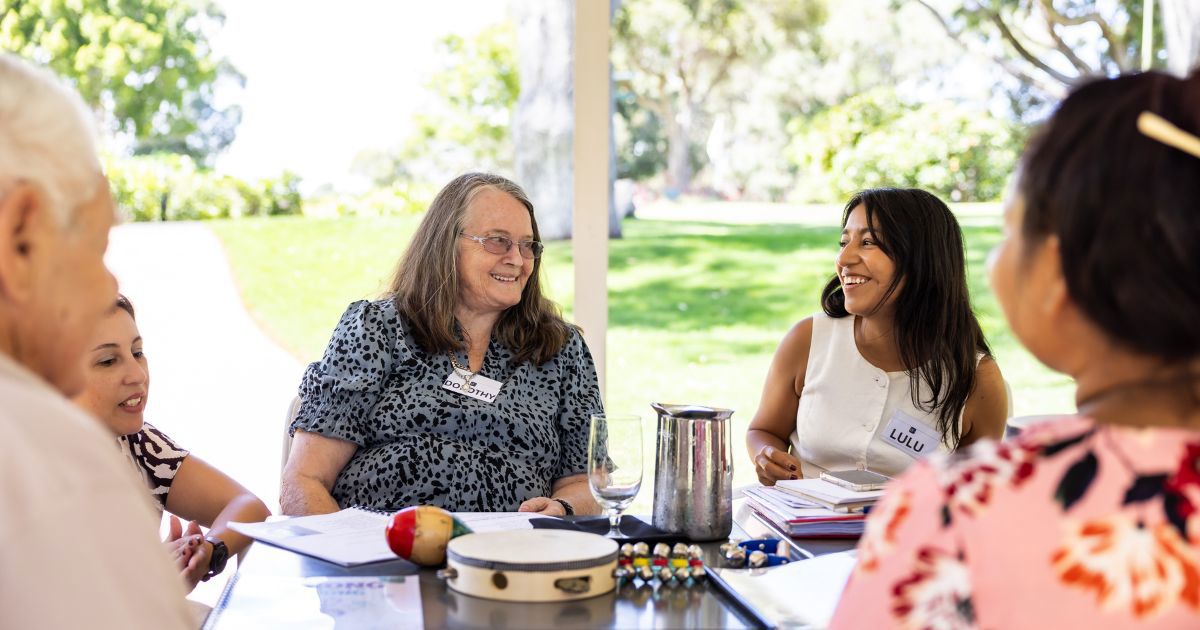
Final thoughts: You’re not alone
Caring for someone with dementia may be one of the most challenging things you'll ever do. It may also be one of the most meaningful. You're giving your loved one the gift of staying in their home, surrounded by familiarity and comfort.
But you can't do it all yourself — and you shouldn't have to.
At Brightwater, we're committed to supporting families through every stage of the dementia journey. Whether it's care at home, respite to recharge, assistance tools to make daily life easier, or guiding you through funding pathways, we're here to help.
You don't have to have all the answers right now. Take it one day at a time, accept the help available, and remember that reaching out for support is a sign of strength.
Let's chat about how we can support you and your loved one through this.
